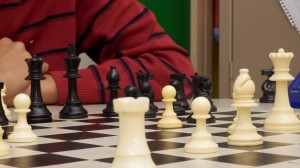Parkway North Chess Team Struggles to Keep Momentum
 Even after triumphs in the state and metro tournaments, North’s chess team is having trouble staying afloat.
Even after triumphs in the state and metro tournaments, North’s chess team is having trouble staying afloat.
Retired history teacher Joe Regenbogen, who coordinates the club, described the chess club as having two purposes: “One is just to get people who want to play for fun…and in that sense it’s a club. But the other is the people who are serious about competition. So, regular members you see here…they’re kind of the nucleus of the team.”
The chess club is a staple at North, with many different teachers manning the helm over the years. Regenbogen, while not holding an official position, has been working on and off to help the team for 14 years. But he says that, in this new school year, the number of competitive members has decreased.
That’s not to say there aren’t people who love to play chess. Most mornings before school, Allison Cundiff’s English classroom is packed with students playing the game. But most of them are casual members; they’re not the type to stay for meetings Wednesday afternoons or spend their Saturdays at competitions. The students there don’t find as much joy in the competitive stage.
“It just seems more fun to play recreationally than competitively,” said Zach Mazzoni. “[My skill level] is good enough to play with friends, but not competitively.”
The obvious answer to lack of numbers is to get more of those part-time members to become full-time ones. But the problem, among other things, may be the intimidation of competitive play. Competitive players rank at a higher level than most, which was what led North to their success in past years. Part-time members may not feel like they have enough skill to play on par with them.
“I was in the chess club in middle school, and went to a few tournaments, but I’m not very good. It doesn’t feel good to play against someone better than you,” said sophomore Jared Dachroeden.
But the only way to get better is to keep playing. For part-time players, and those who want to be, staying safe and playing defense has been a strategy that works. The more they practice, the more confident they can get in their skill and the more enticing competitive play might look like. Taking a risk and playing the offensive is what many players might need to put their doubts into checkmate.
by Jonothan Herzog